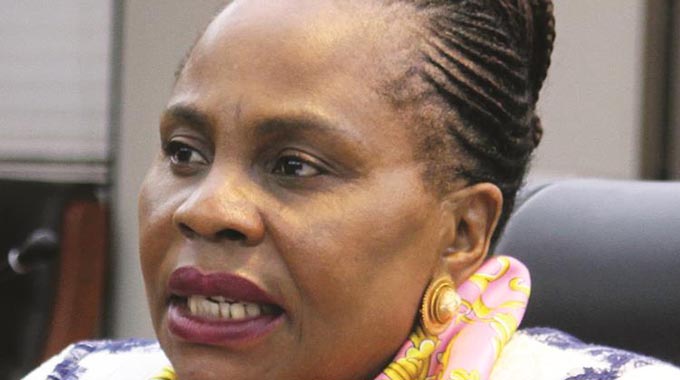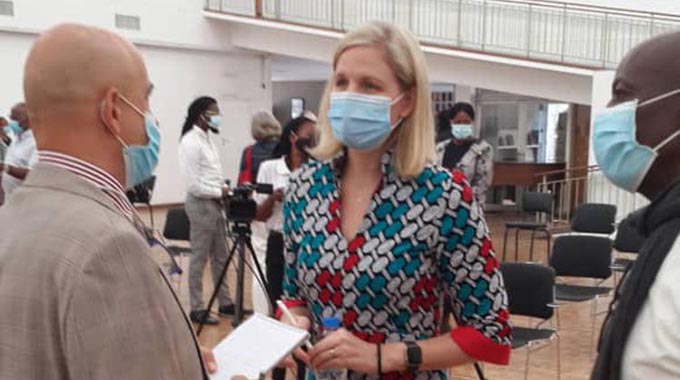‘Women now have a voice’

The month of March is important for women across the globe, Zimbabwe included. On March 22, 2021 the African Women Leaders Network Zimbabwe Chapter High-level Localised Consultation for the CSW65 was held virtually. Attended by key stakeholders from Government, UN family and civil society, the meeting came at a time the country is commemorating women’s month. Information, Publicity and Broadcasting Services Minister Monica Mutsvangwa gave the following keynote address.
I am very pleased to be invited to deliver the keynote address for the African Women Leaders network (AWLN) virtual consultation for the 65th session of the Commission on the Status of Women; which is taking palace jointly with our Chapter’s website launch.
This year we are commemorating the International Women’s Day, under the theme, “Women in leadership: Achieving an equal future in a COVID-19 world.” This theme celebrates the tremendous efforts by women and girls around the world in shaping a more equal future and recovery from the COVID-19 pandemic.
It is also aligned with the priority theme of the 65th session of the Commission on the Status of Women, “Women’s full and effective participation and decision-making in public life, as well as the elimination of violence, for achieving gender equality and the empowerment of all women and girls”, and the flagship Generation Equality campaign, which calls for women’s right to decision-making in all areas of life, equal pay, equal sharing of unpaid care and domestic work, an end all forms of violence against women and girls, and health-care services that respond to their needs.
It comes as no surprise that women stand at the front lines of the Covid-19 crisis, as health care workers, caregivers, innovators, community organisers and as some of the most exemplary and effective national leaders in combating the pandemic.
The crisis has highlighted both the centrality of their contributions and the disproportionate burdens that women carry. Women now have a voice, unlike before. It is this voice that we are using to stand up against domestic violence, fight against sexual abuse and child marriages, and advocate for conditions that ensure equality in our communities.
On December 12 2020, His Excellency, President Mnangagwa met and addressed female councillors, under the banner of Women in Local Government Forum (WILGF). This was the first ever such meeting between a Zimbabwean sitting Head of State and women councillors.
In that meeting, the President said Government was ready to work towards increased inclusion of women in decision making processes, recognising that this is key to widening the democratic space in Zimbabwe.
The President said, (and I quote) “My Government stands ready to consider other options and proposals that will see the inclusion of more women in decision making bodies . . . The need to widen democratic space and increase the participation of women in decision making processes cannot be over emphasised. In doing so, it is important for Women Forums to develop and implement concrete strategies for the realisation of these objectives.”
President Mnangagwa also acceded to proposals for a 30 percent women quota in councils in line with the Constitutional provisions on gender balance.
This is part of Government’s thrust to address the need for a sustainable way forward to attain equality in decision making processes. As you are aware, Government has begun processes to amend the Constitution to cater for the extension by an additional 10 years the provision of the women’s quota that came to life after the adoption of the new Constitution in 2013, but comes to an end in 2023.
The lesson from this is that: The key to shaking up the status quo and improving gender diversity, equality, and inclusion in any institution is by starting with yourself. To do this one has to identify the challenges, shortcomings and gaps that need to be filled and begin advocate from a position of knowledge.
As the African Women Leaders Network Zimbabwe Chapter, we have a duty to push strategies that will guarantee increased women participation in the decision making processes in the political, economic, cultural and other sectors.
Each and everyone of us is a trendsetter in breaking the glass ceiling, fighting gender stereotypes, and furthering the cause of women empowerment in our sectors. We have the enormous responsibility of building on the work of other female leaders who have gone before us, while grooming the next generation of female leaders.
Despite a great deal of progress, women and girls continue to face discrimination and violence in every part of the world, as the African Women Leaders Network, it is our responsibility to change the landscape of women empowerment in Zimbabwe by using our influence to break barriers and proffer lasting solutions to challenges faced by women and the girl child in our communities.
Issues of gender equality are not just issues of human rights, but are fundamental for economic and social development.
Empowering women is essential to the health and social development of families, communities and countries.
When women are living safe, fulfilled and leading productive lives, they can reach their full potential. The way they contribute their skills to the workforce and can raise happier and healthier children. They are also able to help fuel sustainable economies and benefit societies and humanity at large.
As women we bring a different perspective to the decision making process because our struggles and challenges are very different from those of our male counterparts.
It is this different perspective that has seen UN Women acknowledging that the “Majority of the countries that have been more successful in stemming the tide of the Covid-19 pandemic and responding to its health and broader socio-economic impacts, are headed by women.
“For instance, Heads of Government in Denmark, Ethiopia, Finland, Germany, Iceland, New Zealand and Slovakia have been widely recognized for the rapidity, decisiveness and effectiveness of their national response to Covid-19, as well as the compassionate communication of fact-based public health information.”
And Zimbabwe has not been left behind:
The National Taskforce on Covid-19 is headed by a woman, the Minister of Defence and War Veterans Affairs, Honourable Oppah Muchinguri;
Government has appointed a Chief Coordinator for the National Response to the Covid-19 pandemic, Dr Mahomva
And as the Minister of Information, Publicity and Broadcasting Services, my Ministry is responsible for ensuring that every Zimbabwean is apprised of the measures taken by Government to control the transmission and spread of Covid-19 and to fulfil the information needs of the nation regarding Covid-19.
Our work speaks for itself and reinforces the fact that it pays to invest in women because healthy, educated and empowered women and girls are agents of change.
When women and girls are supported, they gain opportunities to speak up for their rights, and also to advocate for their communities. They are also able to rise in social standing, and they can feed this into future generations.
As we deliberate on how best we can collectively work as Government, corporates, influencers, civil society organisations and change makers let us bear in mind that we are the drivers of the aspirations and voices of women and the girl child who are in far flung corners of this country.
The high achieving girl who could one day discover the cure for cancer is under threat of being married off by an unconcerned parent or dropping out of school due to inadequate finances.
The woman who is physically or emotionally abused and has nowhere to go and continues to stay with her abusers.
The young lady who wants to venture into the political arena, but is fearfully due to social barriers.
The female entrepreneur who needs a capital injection to grow their business, but does not meet the requirements of the traditional bank.
The woman who is receiving 15 percent less than her male counterpart while her duties are nine percent more than that colleague.
These are not just scenarios, but the reality of women and young girls across the globe. As you deliberate today, these are the women we should have in mind, our sisters, daughters, nieces, aunts, grandmothers, mothers who we also have to bring to the table.
I would like to give special recognition to the He for She campaign and its champions, who have taken up the cause of the advancement of gender equality, initiated by the United Nations. Indeed, gender inequality is an issue that affects all people, socially, economically and politically, and as such requires the involvement of men and boys in achieving equality by taking action against negative gender stereotypes and behaviours.
When women are empowered and can claim their rights and access to land, leadership, opportunities and choices, economies grow, food security is enhanced and prospects are improved for current and future generations.
I thank you.










Comments